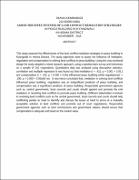| dc.description.abstract | ABSTRACT
This study assessed the effectiveness of the land conflict resolution strategies in peace building in
Kyangwali in Hoima District. The study objectives were to assess the influence of mediation,
negotiation and compensation in solving land conflicts in peace building. Using the cross sectional
design the study adopted a mixed research approach, using a questionnaire survey and interviews
on a sample of 161 respondents. Quantitative data was analysed using descriptive statistics,
correlation and multiple regression It was found out that mediation (r = .415, p = 0.001 < 0.05,)
and compensation (r = .422, p = 0.000 < 0.05) influenced peace building while negotiations(r =
.290, p = 0.000 < 0.05)did not. It was hence concluded that; mediation in solving land conflicts
influenced peace building; negotiation was an insignificant predictor of peace building; and
compensation was a significant predictor of peace building. Responsible government agencies
such as, central government, local councils and courts should appoint and promote the role
mediators in resolving land conflicts to promote peace building. Different stakeholders involved
in resolving land conflicts such as the central government, local councils and courts should help
conflicting parties to meet to identify and discuss the issues at hand to arrive at a mutually
acceptable solution in land conflicts and promote out of court negotiations. Responsible
government agencies such as land commissions and government valuers should ensure that
compensation is adequate and based on the market value. | en_US |

